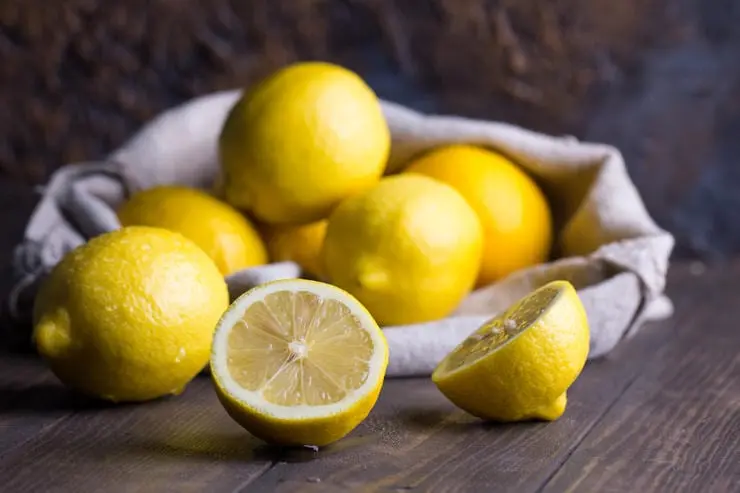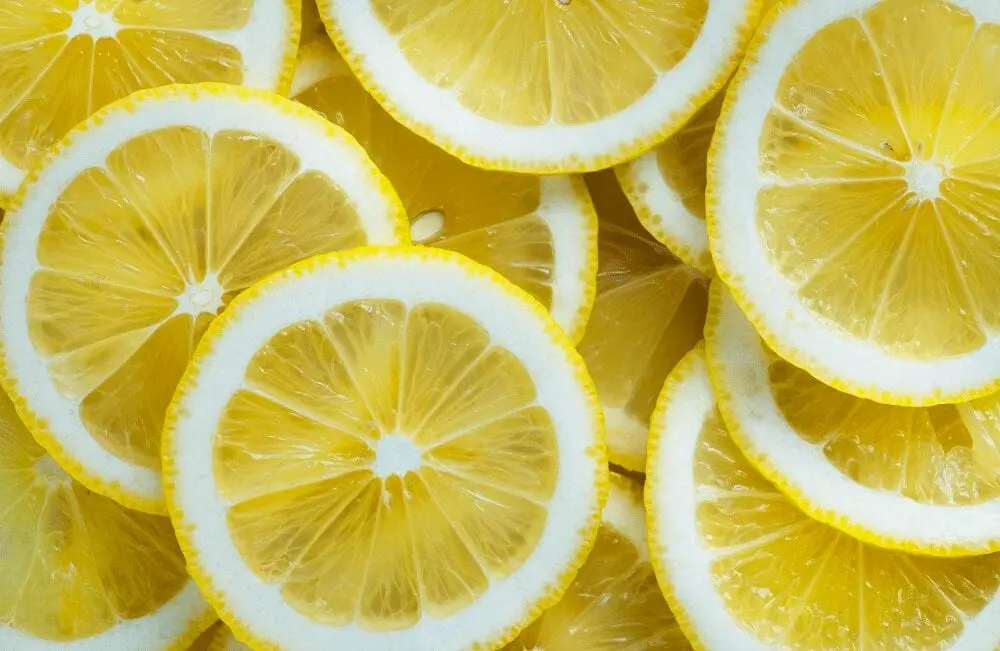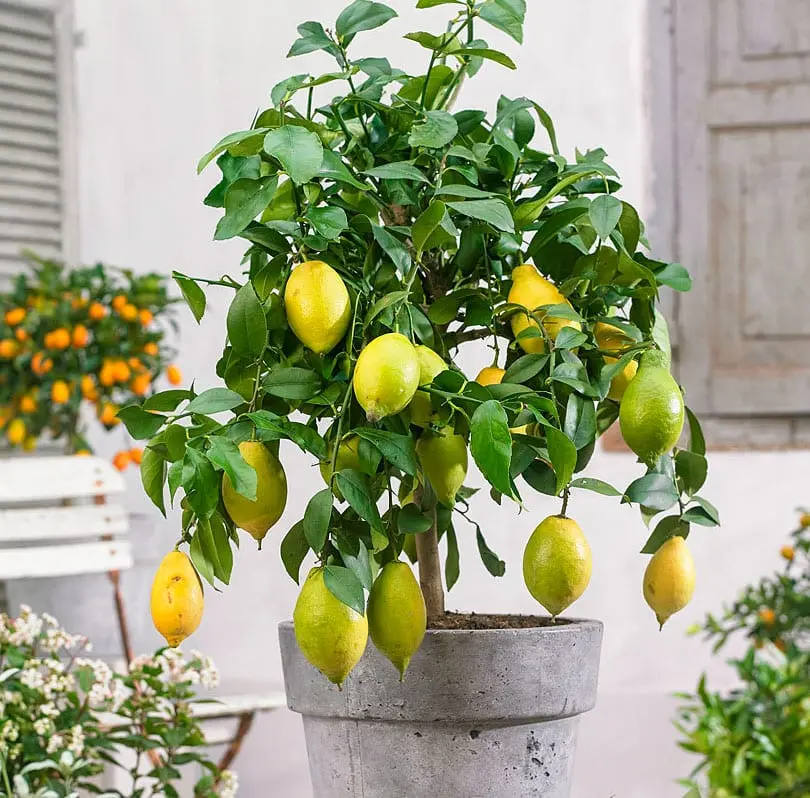Contents
Description
The colder and more cloudy it is outside, the more reasons to remember about lemon: vitamin C will strengthen the immune system, the aroma will cheer you up, and tea with lemon tart will strengthen the effect.
Lemon (lat.Citrus limon) is a plant of the genus Citrus of the subtribe Citreae of the Rutacea family and the fruits of this plant. The bright yellow fruits were first mentioned in the 12th century and come from the areola of India, China and the Pacific tropical islands.
Today lemons are widely cultivated in countries with subtropical climates – 14 million tons of lemons are harvested worldwide every year. Like many fruits, lemon blooms in spring and bears fruit in autumn. Famous and especially appreciated by gourmets are French lemons from Menton, where a whole festival is dedicated to them, and Italian lemons from the Amalfi Coast, from Sorrento.
Composition and calorie content

Caloric content 34 kcal
Proteins 0.9 g
Fat 0.1 g
Carbohydrates 3 g
Dietary fiber 2 g
Water 88 g
Lemon is rich in vitamins and minerals such as: vitamin C – 44.4%, copper – 24%
Lemon: benefits
There are 29 calories in 100 g of lemon. If you consume lemon with sugar, then the calorie content rises to 209 calories. And if you drink water or tea with lemon, ginger and honey, then each glass adds 60 calories to your diet.
The pulp of lemons is rich in organic acids such as citric and malic acids, pectin substances, sugars (up to 3.5%), carotene, phytoncides. Lemons contain vitamins: thiamine (vitamin B1), riboflavin (B2), ascorbic acid (vitamin C), rutin (vitamin P), as well as flavonoids, coumarin derivatives (used as an anticoagulant), hesperidin (helps to strengthen the walls of blood vessels), eriocitrin and eridictiol (to help reduce fat storage).

The seeds contain oil and the bitter substance limonin. Interestingly, lemon leaves also contain vitamin C, and citronine glycoside is found in the bark.
The aroma of lemon is due to essential oil (lemon), which is also found in various parts of the plant, and aromatic molecules of terpene, α-limonene (up to 90%), citral. In aromatherapy, lemon oil is used for headaches, anxiety, bad mood, depression.
The scientifically proven benefits of lemon for heart health (including reducing the risk of heart attack), lowering cholesterol, fighting anemia (vitamin C favors the absorption of iron from plants).
Lemons are believed to help fight kidney stones (this requires ½ cup of lemon juice a day). Lemon essential oil and high concentrations of substances found in the white parts have been shown to have anti-cancer effects in animal studies.
At the same time, the benefits of lemon for weight loss turned out to be an exaggeration. While the pectin in lemon helps you feel full, it is found in the white portion, which is usually not eaten. In addition, the polyphenols contained in the skin have an effect on reducing weight gain. However, this study was conducted on mice, and the effect of lemon on weight was not investigated in humans.
Lemon: harm
Citric acid is corrosive and organic solvent. It has a negative effect on tooth enamel, so after drinking lemon it is recommended to rinse your mouth with clean water. Continuous contact of lemon juice on the skin of the hands can cause painful burrs (bartender disease). In addition, lemon juice will dissolve nail polish.
Lemon for colds
What about the effect of vitamin C on immunity in case of a cold? Here scientists point out that the content of vitamin C in orange is higher than in lemon. In addition, it takes 1000 mg of the vitamin per day to be effective during colds, while one lemon weighing 80 g contains 42.5 mg. To get the right amount, doctors recommend the use of vitamin C preparations.
Ginger with lemon and honey: recipe

The most popular natural remedy for colds, after raspberry tea, is a mixture of lemon with ginger and honey, which is diluted with hot boiled water and drunk.
Ingredients:
0.5 l honey
0.5 kg lemons
100 g ginger
Wash the lemons thoroughly, pour over with boiling water and cut with the peel. Peel and cut the ginger into pieces. Pass the lemon with ginger through a meat grinder or chop with a submersible blender, add honey to the mixture, mix. Keep refrigerated. Eat a bite with tea or dilute in warm tea.
How to choose the right lemon?
You can often see lemons on supermarket shelves that look different. If you try them, it turns out that these fruits also differ from each other in taste.
Some are small, with a thin crust and juicy, dense flesh, a little heavy for their size. Others are large, thick-baked, with friable flesh and less juicy, lightweight. There are often recommendations that it is necessary to choose exactly thin-cored fruits, since they are better.
10 interesting facts about lemon

- India and China are considered to be the homeland of lemon. There is a theory according to which lemons came to Greece with the soldiers of Alexander the Great after their campaign in India. Then the lemon was called the Indian apple. Another theory says that the Arabs brought the lemon to Europe and the Middle East.
- But in the distant 17th century in Russia there were no lemons. Only the rich could eat them: they ordered salted lemons from Holland.
- The origin of the word “lemon” is attributed to the Malay and Chinese languages. Le-mo in Malay and li-mung in Chinese means good for mothers.
- They even make riddles about lemons and write funny stories. From them you can learn that with the help of lemon you can disrupt the performance of a brass band: it is enough to eat a lemon in front of the musicians. Those will begin to salivate profusely, and they will not be able to play the wind instruments.
- There is a theory that the lemon was the bone of contention in the Bible. According to another theory, it was a pomegranate, as we have already written about.
- Despite the “bone of contention” from the theory above, lemon is considered the fruit of friendship. Otto Schmidt, a famous polar explorer, inoculated a lemon in 1940 – before that, the tree was grafted by breeder Zorin. Since then, an interesting tradition has started: people from different countries began to graft this tree. In 1957, the lemon tree was named the Friendship tree. To this point, 167 vaccinations have been given to lemon. Today there are more than 3,000 of them, just imagine! Yes, the tree is still alive and growing in Sochi.
- Foreign journalists call some athletes lemons. For example, the French called Evgeny Kafelnikov lemon – he was taciturn, cold and did not make contact.
- Lemon is often found in Spanish folklore. There he symbolizes unhappy love. But the orange is responsible for the happy one.
- Every year 14 million tons of lemons are harvested in the world. Most lemons are harvested in Mexico and India.
- Lemon was listed in the Guinness Book of Records. A simple Israeli farmer has grown a lemon weighing more than 5 kilograms on his plot. Can you imagine what size it should be? By the way, the record cannot be broken for 14 years already.









